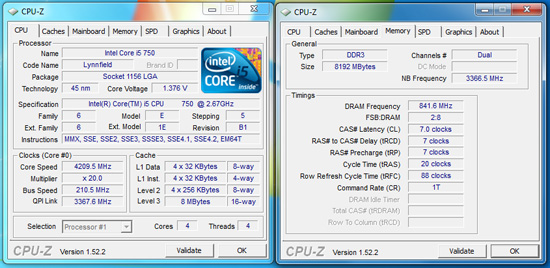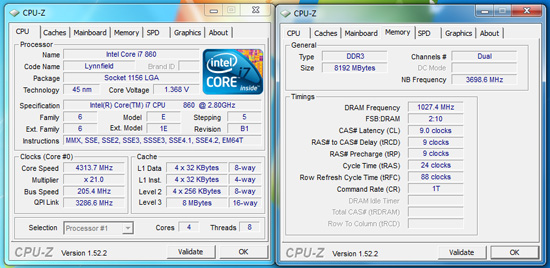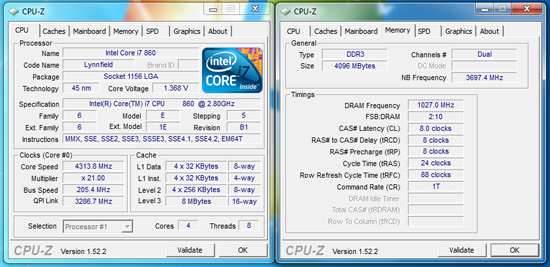MSI P55-GD65 - Mid-Range P55 for the Masses
by Gary Key on October 10, 2009 12:00 PM EST- Posted in
- Motherboards
Overclocking
The P55-GD65 offers a very good overclocking experience. Some additional BIOS tuning would make this a great motherboard for most enthusiasts.
Core i5/750 8GB Results

Our maximum stable overclock on air-cooling with the Core i5/750 resulted in a 4.2GHz clock speed at a respectable 210MHz Bclk with a variety of 8GB DDR3-2000+ kits. The primary voltages settings were 1.3625V VCore, 1.38V VTT, 1.83V PLL, and 1.65V VDimm. The VCore setting is deceiving. We had to run the board with Load Line Calibration (Low Vdroop) enabled for stability. This meant setting our voltage manually to 1.3625V with load rates rising to 1.3975V.
We could not stably run our memory above DDR3-2000 with 8GB loaded and the i5/750. We scaled back to DDR3-1683 at C7 timings which offered the same performance, if not better, than DDR3-2050 C9.
Core i7/860 8GB Results

Our i7/860 fared better clocking wise than the i5/750, with a 21x205 setting for 4.3GHz. Memory was set at DDR3-2055 with 9-9-9-24 1T timings at 1.65V.
VTT is set to 1.39V, PLL at 1.85V, VDimm at 1.65V, and VCore at 1.350V with LLC (Low Vdroop) enabled. Under load conditions VCore was +.015V~+.02V with low Vdroop enabled and -.04V~-.05V with it disabled. Our Core i7/870 clocks matched these exactly.
Core i7/860 4GB DDR3-2400 Results

MSI advertised up to DDR3-2400 speeds so we decided to verify their claim. Unfortunately, the board had serious problem running our DDR3-2400 Blade kit at 2400 with the stock 9-10-9-24 1T settings on 1.65V. We just could not dial in that memory speed. We had to settle for DDR3-2055 8-8-8-24 1T timings at 1.65V. The primary problem being that the board strictly utilizes the SPD under auto settings and the board tried setting the base 7-7-7-20 SPD settings at 2400. Even manually tuning each individual setting still resulted in a limit around DDR3-2100. Of course, our final settings is more than fast enough for application usage and let’s face it, nobody will be buying this board thinking they are going to break world records.
Thoughts
The overclocking results are very solid and certainly 4.2GHz~4.3GHz speeds are fast enough for most users. We have no concerns recommending the MSI P55-GD65 board for 24/7 overclocking use. When overclocked, the board is extremely stable. Our only concern is that S3 resume did not work properly with the Bclk set above 190.










43 Comments
View All Comments
yacoub - Saturday, October 10, 2009 - link
Did I miss the list of PSUs that OCGenie had conflicts with? That would be important and helpful data to have in the article and I couldn't find it.Also, this board could be a winner if it didn't have so many archaic parts, like IDE and floppy. Really, MSI, drop those already! Even though there's probably no actual downside to having those items on the board, it actually does make me think less of it and discourage me from considering it. That plus the PSU and BIOS issues keep this from being my first choice.
Eagerly awaiting the other upcoming reviews. :)
michaelheath - Saturday, October 10, 2009 - link
On the first page, issues with Channel Well power supplies and OC Genie were mentioned as being a commonality between the GD65 and the GD80. What would be nice is if Gary would clue us in as to what particular models were giving him grief. Is it CWT's older designs? Is it newer DC-DC designed power supplies?The quagmire comes from the mention of Channel Well, Antec, BFG, and Corsair in the beginning of the article. Channel Well makes some Corsair power supplies, but BFG and Antec haven't used CWT recently for any of their power supplies.
Perhaps someone could clear the air, because I was planning on buying a high efficiency power supply with an MSI P55 board in the near future.
yacoub - Saturday, October 10, 2009 - link
Right. In particular, I am curious if the modular Corsair PSUs, which are a personal favorite, are on the list. The HX520W and HX620W, for examples.punjabiplaya - Monday, October 12, 2009 - link
Using an HX620 with my gd65 right now. works perfectly fine.michaelheath - Saturday, October 10, 2009 - link
...and when I said "Antec" I meant "Thermaltake", which has used CWT for many of their ToughPower units. My bad.punjabiplaya - Saturday, October 10, 2009 - link
I bought this board with a i5 750 and it's been rock solid. Noticeably quicker boot times than my old q6600/680i setup. The only problem I have is with the memory/XMP settings. I'm using a G-skill ddr3 2000 kit. When I set it to auto it shows the memory at being 1600MHz. When I reset and/or boot, it's set at 1333. However, if i set it to advanced or w/e the other setting is, it works and sets the memory at 2000MHz. Other than that, really good board and exceptional value for the price.punjabiplaya - Saturday, October 10, 2009 - link
I bought this board with a i5 750 and it's been rock solid. Noticeably quicker boot times than my old q6600/680i setup. The only problem I have is with the memory/XMP settings. I'm using a G-skill ddr3 2000 kit. When I set it to auto it shows the memory at being 1600MHz. When I reset and/or boot, it's set at 1333. However, if i set it to advanced or w/e the other setting is, it works and sets the memory at 2000MHz. Other than that, really good board and exceptional value for the price.goinginstyle - Saturday, October 10, 2009 - link
Just wanted to say that I really like the new way you are introducing the motherboard articles with the results and conclusions right up front. This article and the mATX were really good.MadMan007 - Sunday, October 11, 2009 - link
Yeah it keeps me from just jumping to the conclusion page then back to read the rest of the article if I want to. Well done.jigglywiggly - Saturday, October 10, 2009 - link
Where be the conclusion